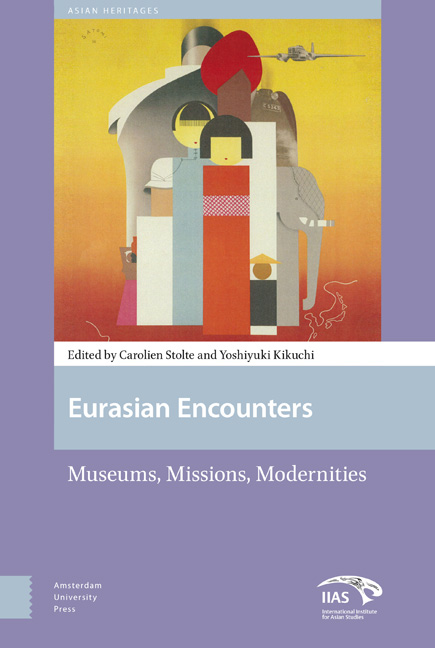Book contents
- Frontmatter
- Contents
- 1 Eurasian Encounters: Cross-border Intellectual and Cultural Exchange, 1900-1950
- Part I Artistic Spaces
- 2 The Museum at Aundh: Reflecting on Citizenship and the Art Museum in the Colony
- 3 Exhibiting the Nation: Cultural Flows, Transnational Exchanges, and the Development of Museums in Japan and China, 1900-1950
- 4 Parallel Tracks: Pan Yuliang and Amrita Sher-Gil in Paris
- 5 Bauhaus and Tea Ceremony: A Study of Mutual Impact in Design Education between Germany and Japan in the Interwar Period
- Part II Missions and Education
- 6 Schooling a Missionary in Early Twentieth-Century Eastern India
- 7 The Catholic Church in China in the First Half of the Twentieth Century: The Establishment of Zhendan University and Furen University
- Part III Shared Trajectories, New Subjectivities
- 8 Indigenizing Cosmopolitanism: Shifting Metropolitan Subjectivities in Twentieth-century Colombo
- 9 Fighting for the Soviet Empire: War Propaganda Production and Localized Discourses on Soviet Patriotism in Uzbekistan during the Second World War
- 10 Shared Origins, Shared Outcomes?: Transcultural Trajectories of Germany and Japan during the Asia-Pacific War
- Index
1 - Eurasian Encounters: Cross-border Intellectual and Cultural Exchange, 1900-1950
Published online by Cambridge University Press: 12 December 2020
- Frontmatter
- Contents
- 1 Eurasian Encounters: Cross-border Intellectual and Cultural Exchange, 1900-1950
- Part I Artistic Spaces
- 2 The Museum at Aundh: Reflecting on Citizenship and the Art Museum in the Colony
- 3 Exhibiting the Nation: Cultural Flows, Transnational Exchanges, and the Development of Museums in Japan and China, 1900-1950
- 4 Parallel Tracks: Pan Yuliang and Amrita Sher-Gil in Paris
- 5 Bauhaus and Tea Ceremony: A Study of Mutual Impact in Design Education between Germany and Japan in the Interwar Period
- Part II Missions and Education
- 6 Schooling a Missionary in Early Twentieth-Century Eastern India
- 7 The Catholic Church in China in the First Half of the Twentieth Century: The Establishment of Zhendan University and Furen University
- Part III Shared Trajectories, New Subjectivities
- 8 Indigenizing Cosmopolitanism: Shifting Metropolitan Subjectivities in Twentieth-century Colombo
- 9 Fighting for the Soviet Empire: War Propaganda Production and Localized Discourses on Soviet Patriotism in Uzbekistan during the Second World War
- 10 Shared Origins, Shared Outcomes?: Transcultural Trajectories of Germany and Japan during the Asia-Pacific War
- Index
Summary
Introduction
The chapters in this volume were first presented at a joint IIAS-ISEAS international conference entitled Asia-Europe Encounters: Intellectual and cultural exchanges 1900-1950, which was held at the Museum of Asian Civilizations in Singapore. The conference attracted a particularly interesting mix of scholars – junior and senior academics, from universities across the globe, whose research covered the length and breadth of Europe and Asia. The present collection of essays builds on the results of this conference. The editors hope to have succeeded in maintaining the diversity that made the conference so dynamic. This volume therefore contains chapters by leading researchers in the field as well as early-career scholars, and covers a range of countries from India and Sri Lanka to China, Japan, Russia, Uzbekistan, Germany, and France.
The conference had been convened to explore the intellectual and cultural flows between Asia and Europe that occurred during, and were formative of, the political and social changes over the first half of the twentieth century. As the original call for papers stated, the first half of the twentieth century saw some of the most intense political and social changes experienced thus far in world history. Shiraishi Takashi's coinage of the 1910s and 1920s as an ‘age in motion’ in Southeast Asia might be extended as a reference to Asia-Europe relations during the half-century more generally. It was an age in which high imperialism began to unravel and global power shifted. The period around 1950 marked the ending of one age of Asia-Europe interactions and the beginning of another.
This volume explores the intellectual and cultural flows between Asia and Europe during the momentous political and social changes of the first half of the twentieth century. More specifically, it situates those flows in a context of an increased mobility of artists, writers, educators, and missionaries, as well as an increasingly global consciousness among those who worked or wrote from home. While cultural and intellectual exchange in the larger area of Eurasia was by no means a new phenomenon, it was in the first half of the twentieth century that these interactions were marked by an unprecedented increase in transnational traffic and in the development of cosmopolitan subjects, resulting in new collocations of ideas and cross-cultural influences.
- Type
- Chapter
- Information
- Eurasian EncountersMuseums, Missions, Modernities, pp. 7 - 22Publisher: Amsterdam University PressPrint publication year: 2017



